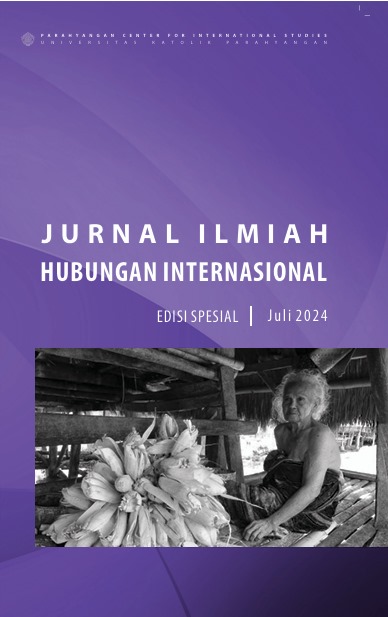The Interplay of Public/Private and Agent/Victim Dualism in Sustainable Living Practice: Indonesia’s Case
DOI:
https://doi.org/10.26593/jihi.v1i1.7831.118-130Abstract
An examination of sustainable living practices through the lens of ecofeminism is the subject of this article. In this article, sustainable living practices refers to the actual implementation of environmentalism ideas in everyday situation. The selection of this subject is deemed significant due to the prevailing trend in environmental literature to associate it as pro-environmental behaviour that, unlike environmental activism, exclusively with the upper
middle class, thereby rendering it feeble, apolitical, and inconsequential. This study aims to evaluate the correlation between pro-environmental behaviour and environmental action and activism by examining sustainable living practices through the lens of gender. Departing from Ecofeminism, it attempts to incorporate insights from relevant literature to enhance the discussion. Availing from exploratory field observations, this study uses Indonesia as a case studies. The study found that, in addition to the availability of social media and spiritual
factors, there are educational orientation that, related to cultural and religious aspects, bridges private/public elements as well as agents/victims division in Ecofeminism discourse. The transformation of the movement’s character from individualist to collectivist is influenced by global political dynamics, as well as showing the moral and spiritual orientation of this movement.
Keywords: sustainable living practice, ecofeminism, environmental care, pro-environmental behaviour, environmental activism
Downloads
Published
Issue
Section
License
Copyright (c) 2024 Jurnal Ilmiah Hubungan Internasional

This work is licensed under a Creative Commons Attribution 4.0 International License.
This journal uses Creative Commons license (CC BY). We allow readers to read, download, copy, distribute, print, search, or link to the full texts of its articles and allow readers to use them for any other lawful purpose. The author must be aware that the article copyrights will be fully transferred to Jurnal Ilmiah Hubungan Internasional only if the article is accepted to be published in the journal through signing of the Copyrights Transfer Agreement. Authors are allowed to resend their manuscript to another journal or intentionally withdraw the manuscript only if both parties (JIHI and Authors) have agreed on the related issue. Once the manuscript has been published, authors are allowed to use their published article under Jurnal Ilmiah Hubungan Internasional copyrights.





